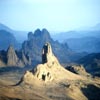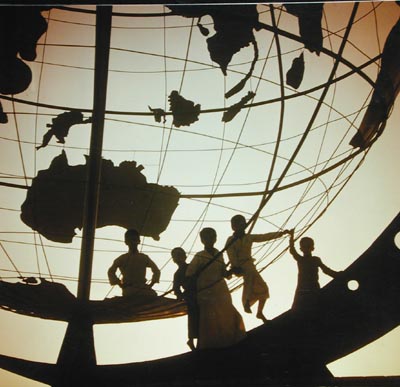|
|
|
||
|
|
Arab boys on globe, Jeddah, Saudi Arabia |
|||
|
The peace and beauty of the Arabian desert ended abruptly when I arrived in Jeddah after my 5000 mile overland drive from UK. I had been towing a 25ft caravan across some of the most picturesque eastern terrain, the Taurus mountains in Turkey, the biblical villages of Syria, the broad wadis of Jordan and the sweeping dunes of Saudi’s Nafud Desert. Suddenly and everywhere there were flyovers, skyscrapers, streetlights, desalination plants, generating stations, countless stockpiles of building materials, and then shops, showrooms, exhibitions, conference centres, hotels and finally an insoluble traffic jam comprising Cadillacs, Rolls Royces and Lamborghinis jostling for position with Chevrolets, Mercedes and Ferraris. I steered my 40 ft charge apprehensively past khaki clad traffic police who lounged un-authoritively on corners ready to fire their side arms at fleeting motorists who ignored their casual gestures. On one more major junction the traffic was stationery, an inextricably woven tangle of horn blowing hardware showing no promise of movement; I pulled off onto a sandy reserve on what turned out to be Jeddah's Hyde Park Corner, and decided this was to be my new home. My long journey was over. It was Christmas Eve, an event unknown in Islam, and the traditions easily forgotten in the 100'F climate. I lowered the sun awnings, uncoupled the Range Rover and unpacked the scattered remnants of 5,000 jolting miles. Order restored, I changed and uncorked a bottle of unfamiliar 'Mecca Water’, the staple diet of Saudi's thirsty immigrants; before long there was a knock on the door. An Arab – white thobed, red head-dressed, dripping in expensive aftershave and speaking Sandhurst English. Welcome to my country" he said graciously. I liked him. "Please come in" I said, and he did. Yousuf was of the new Saudi Arabia – well travelled, well educated, and coming from a keenly commercial family who were quick to see the financial opportunities created by the young country’s newly commenced development programme. In a short time he had fired me with enthusiasm for the enterprise and opportunity of his great country. Saudi’s humble beginnings, under the sword of King Abdulaziz had matured, in little more than a generation, into a patriotic, ambitious and lately rich kingdom where the fruits of endeavour abounded. With typical instant Arabic generosity Yousuf invited me to meet his friends, his staff, his commercial entourage... and I was pleased to accept. We sat on the floor of his office drinking sweet tea and swapping commercial news. Returning to my caravan much later, a note on the door read "'Is
the caravan for sale, please call…". After this I had a succession of visitors, French, Swiss, American, German, Australian, Italian, British, Arabic and others, for no other reason that I was obviously 'new’ in Jeddah. In a very short time I was swept into the tide of this boomtown. Everyone’s news was good news, every business was expanding. Helicopters buzzed continuously overhead from ship to shore, unloading cement and beating the off-loading delay at Jeddah at this time. The airport hummed with activity, flights arrived from every country at every hour. Everywhere, entrepreneurial Saudis were starting new endeavours, looking for gaps to be filled in the commercial marketplace. Unexpectedly, and cautiously received, were offers of partnership from such Saudis. It seemed there was no photographic advertising expertise in Jeddah or indeed in the kingdom. I saw the opportunities; I liked the buoyant atmosphere of commercial activity. Recessive London seemed a long, cold way off. I sold the caravan quite quickly for an adequate if not unreasonable price. Hotels at this time cost a staggering £100 per night, (equivalent to around £600 now) and whisky, if you could find it, cost £80 per bottle. So I drove out to the Red Sea with a bottle or two of 'Mecca Water' and camped contendedly in the Range Rover. I was taken to meet a royal prince in the privileged style of his people, who may call upon his guest palace at any time, without invitation, where they will be assured of an interview in which to air their problems, or simply to call Allah's blessings upon this royal household 'which welcomes your humble servant' etc etc. A plan was born, with the help of a mincing royal advisor, his ambition unmatched by his intelligence, and I returned from that first trip to Jeddah clutching a proposal of partnership from His Royal Highness Prince Talal bin Mansour bin Abdulasis al Saud, by the grace of God. An Expatriate’s
Jeddah Three months after the unexpected invitation from a Saudi prince to establish a joint venture in Jeddah, the difficult details of the family's social turnaround were resolved. Lyn would live in England and come to Jeddah in school term times; I would live an expatriate's life in Saudi, returning to UK for selected holidays as business would permit. Socially a major sacrifice, viewed with little enthusiasm by Lyn and the two boys, but forced in the face of what I considered to be an important commercial window. The bones of the joint venture were simple if necessarily trusting on both sides, and called on my partner to provide the outrageously expensive provision of studio and apartment, together with work permit, car and working capital. This to be unequally matched by my assignment of all my photographic equipment valued at £8,000, plus my uncharged time and expertise, in return for a half share of profits. I returned to Jeddah early in 1977 and spent a long time explaining
to the incredulous Customs Officer my £500's worth of excess baggage
comprising cameras, lenses, enlargers, dishes, tanks, studio lights,
tripods and all the paraphernalia of my profession. The apartment had been empty for some three months prior to my arrival. A ripe brie cheese clung limply to the of a kitchen cupboard, clearly the better for its 12 midsummer weeks; a colony of ants marched boldly across the kitchen collecting spilt sugar, while the WC delivered itself of a gassy gurgling accompanied by a typhoidal aura, and an unwary cockroach crunched noisily underfoot. A summer sandstorm had percolated every corner, not least the bedroom where a pilfered air conditioner had vacated a gaping hole in the wall, and the fly screens held a powdery deposit of fine white dust which laughed off my domestic endeavours and clogged the vacuum cleaner. The bath held my water supply. The town's desalinated mains supply was a brief, occasional event, so baths were left stoppered and taps on for the gamble of collecting this undervalued commodity. Air conditioners wrestled the temperature noisily down to an acceptable 95'F while saucepan showers, three a day, maintained nursery standards of hygiene. I ventured out past the garbage that littered the front entrance. Fat, fearless rats shared bones with cats, while flies and cockroaches swarmed from every dark corner; I went out into the street, the only infidel in a teeming market of countless Arabs, all thobed and swathed in the timeless style of their desert country, variously offering wares of fruit, herbs and hardware alongside switchgear, hydraulics and electronics. I walked with fascination among this plethora of contradiction while shops would empty for prayers at the Koranic call. I would stand about awkwardly, fidgeting, while the devout bowed, stooped and bowed in the unbroken practice of their religious discipline. The experience was strange, lonely and compelling; I have seldom felt so alone. The colourful scene was a photographers feast, denied however by the strong cultural mistrust of this instrument of infidels. In these parts a camera would be quickly confiscated by police or civilian alike, and many an outraged expatriate fell to this indignity for being apparently so insensitive to his Host country's culture. My photographic work would be in studio and on industrial location, outside the orbit of cultural objections, with care. Next day I awoke at dawn to the muezzin's call from the first of 21 mosques in the immediate vicinity. Like hounds on a prairie another answered the first, three more joined in, then many more in a thrilling crescendo so essentially foreign to our Western ways. There were over 1500 mosques in Jeddah at that time. At my new studio, the erstwhile Lamborghini showroom, a message had been waiting for a month; Someone wanted a commercial photographer ... and please ring". I rang, mastering the faltering telephone system with difficulty, and picked up my first job. It was 'Typhoo Tea', and they wanted a PR shoot at three chosen tea-house locations, which the marketting agent and I set up for that same afternoon. The film was taken to London on the night flight, and delivered to the clients city office, processed, next morning, less than 24 hours later. This gave me great job satisfaction, I thought, and I can handle it. It was an encouraging start to a speculative venture; I was beginning to enjoy Saudi and its medieval social structure. There was much work to be had, plenty of film but no quality processing. And no commercial art and design services. After 4 months the partnership employed Ned, a graphic design artist, and Kamal, a driver/interpreter. Work increased, with demands for promotional photography for manufacturing joint-ventures, international trading companies, newly opened hotels, new skills and new products. The films were despatched by friends and clients to London for processing, the lab mailing back to Lyn who ran a private courier service out to Jeddah for me. This arrangement was fraught, with obvious hazards, like loss of irreplaceable film, and the weekly conflict of Arabic weekends (Thursday and Friday) running into Western weekends (Saturday and Sunday) leaving only three working days when East/West communications were operable; providing, of course, you remembered to add three hours to local times, recalculating for British Summer Time, whenever that was. It soon became clear the studio should operate in-house colour processing, and this I installed in November 1977. I calculated the considerable capital costs of purchase, transport and installation would be recovered through sales of Cibachrome colour enlargements, and although this was a new field for me I was able to force my way into colour print production with little delay and few disasters, while adding a creative new dimension to my work. Later I took an order one evening for 15 Cibachrome pictures to be printed in time for a contractor's meeting at 09.00 next day. It was now 5.15pm. I quoted £250 each for the 15"x12" enlargements and worked all night. By dawn I was shattered... and had a bunch of stunning enlargements, force dried and card mounted, all delivered on time. The contractor used them as evidence of completion of his contract, and was paid the disputed £1.7m still owing. Such was the way we did business in those crazy days. At this time I took on a second photographer, Peter Davidson, recruited from seventy applicants to my one advertisement in a British trade magazine, and chosen predominately for his suitability of temperament to the heat, the hassles, the Arabs, the flies, the power cuts, the voltage surges, the language barrier, the wheeling and dealing and baksheesh and dust and humidity and, and, and... Peter survived these and more, and virtually carried the company while I recovered from a disastrously timed and virulent dose of hepatitis, which would take, as everyone had helpfully said, several years to overcome. Yellow as a spring daffodil, and two stone lighter I steered my interests through several major crises of management, caused by unrest in my royal patron’s commercial household. Patience, persuasion and determination held the enterprise together at that time, while I became more and more financially exposed and the studio handled more and more work. Next part to follow - er - fairly
soon... |
||||



